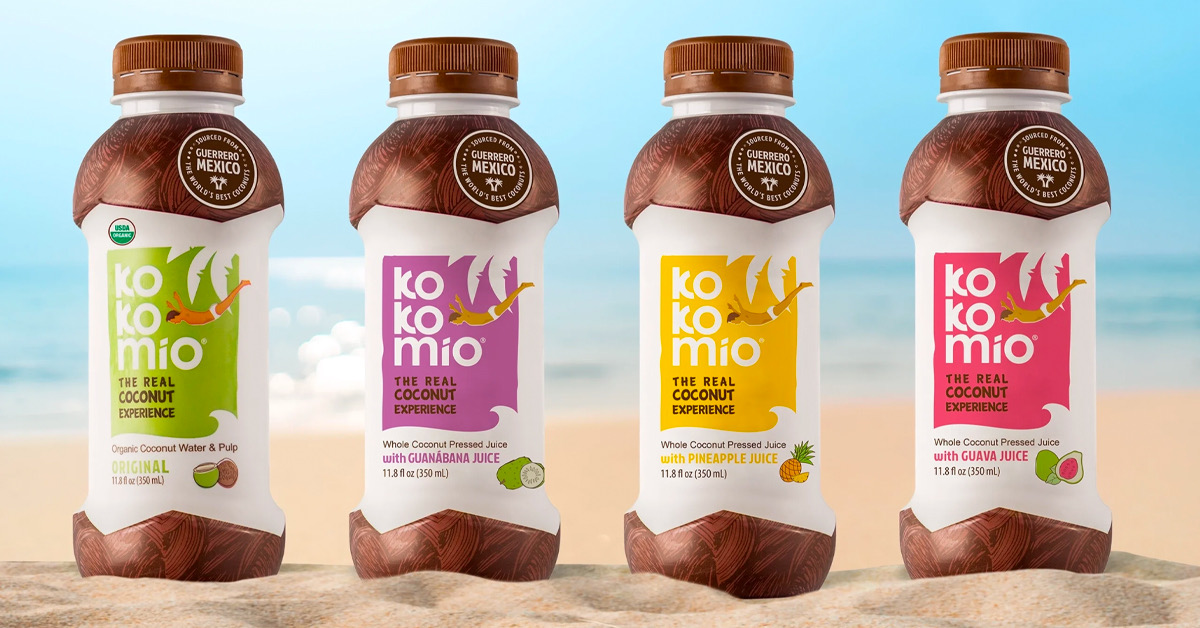
On his regular trips to Acapulco, Mexican beverage manufacturer Alan Cohen has had a longstanding passion for the experience of drinking water from a fresh coconut pulled straight from the tree. However, despite various attempts to translate that experience into a CPG product, Cohen believed the taste has never truly been replicated.
“I traveled constantly to the U.S. and I couldn’t recreate that experience [in Acapulco] with any coconut beverage in that market,” he said. “What I found was that 90% of the coconut water market in the U.S. comes from Asia … it’s a completely different taste than Mexican coconuts and my experiences on the beach. So I figured that the formulation that we have, we could sell it in the U.S.”
That idea has bloomed into Kokomio, a sustainable pressed coconut juice and coconut water beverage startup launched by Cohen in 2021. The brand’s core line of organic juices – which are made with coconuts sourced from Guerrero, Mexico, the state where Acapulco is located – achieve a creamy texture by blending the coconut “meat” and water together with additional fruit juice.
Initially available in Original and Pineapple varieties, Kokomio introduced two new tropical flavors to the line this past spring – Guava and Guanabana, a fruit native to the Americas described as having a “sweet and sour” taste (also known as soursop). The drinks retail for $4.99 per 11.8 oz. bottle. As well, the company has now added a traditional coconut water line, available in 8 oz., 16 oz. and 32 oz. bottles. The organic beverages were launched at Natural Products Expo West 2023 in March and have since rolled out to stores nationwide.
Based in Mexico City, Cohen has served as the CEO of Mexican cold-pressed juice maker Jus Lab and beverage manufacturer Bev Lab since 2016. He began developing the idea for Kokomio in 2018 with the goal of launching the product in the U.S. as a means of expanding his business into the U.S. market.
Initially slated to debut in 2020, Kokomio’s rollout was delayed about a year due to the pandemic. However, Cohen said that setback gave him more time to improve the brand’s sustainability bonafides and refine a “circular economic model” for the business that could reduce costs while maintaining environmental responsibility. The company began using the hair from coconut husks as insulation for its packaging, which allowed for a significant price reduction and made direct-to-consumer ecommerce a viable sales model. Cohen was even able to bring more money into the business by saving on waste disposal costs.
“Sometimes people don’t understand the word and … think that ‘sustainable’ means ‘more expensive,’” he said. “It has to help you on the business. So basically, every decision that we make, we take into account the people, the environment and the profits of the company.”
Since launching in 2021, Kokomio has upgraded its formulation and production to increase shelf life for the cold-chain pressed juice line to 120 days. The brand also dropped one flavor (cacao) in favor of the two new tropical fruit additions, which Cohen said meets a rising trend while helping to differentiate the brand from a wide number of vanilla and mocha SKUs on the market.
Kokomio is now available in around 600 U.S. stores mainly in the natural and specialty channels. But the brand is set to widen its reach this month by launching nationwide with Sprouts, with Central Market, Lassens and Jimbos, among others, scheduled to follow. By the end of this year, Cohen hopes to grow that footprint to over 1,000 doors with target revenues of $1.5-$2 million.
“Our strategy is to go into the South of the U.S. to start, starting with California, moving to Texas and moving to Florida … and just to have something that is a certain amount that we can actually control it by going deep with those retailers and make sure we drive velocity and we drive trial and make it more sustainable,” he said.

While Kokomio has positioned itself as a better-for-you and better-tasting alternative in the existing U.S. coconut water category, its innovations are in some ways following the trends laid out by existing category leaders such as Vita Coco, which introduced its own blended Pressed line in 2018. According to The Vita Coco Company’s full year 2023 earnings report, Pressed has an ACV of 69% in the U.S. market, as of February 26, 2023.
Following Coke’s discontinuation of number-two U.S. coconut water brand Zico in 2020, Vita Coco has positioned itself at the front of both sales (up 13% in 2022 to $428 million) and innovation in the category. Market research firm Circana reported retail sales of Vita Coco’s core aseptic line up 16.1% to $264.7 in the 52-weeks ending February 26; comparatively, sales of aseptic products from C2O declined -2.2% to $10.8 million while the relaunched Zico Rising, now back under control of founder Mark Rampolla, grew 123.9% to $4.3 million.
As Kokomio looks to grow its name in the U.S., Cohen said the brand will look to employ more guerilla marketing tactics, as well as demos, promos, social media and geotargeting campaigns around beach towns this summer. With the Sprouts rollout underway, Cohen said the brand has also sought out the retailer’s employees by offering free samples in hopes that store staff will want to help support the brand and become customers themselves. The company has kept its business circle tight thus far, being primarily self-funded by Cohen and his father and with just three full time employees.
Looking ahead, Cohen said he’s in no rush for Kokomio to grow rapidly and spread itself thin, and instead aims to employ a deep regional strategy to maintain profitability with long-term performance in mind.
“We don’t want to just grow and grow and grow just to bring more sales,” he said. “I think the company has more value when you start growing steadily, and you start growing with profits.”